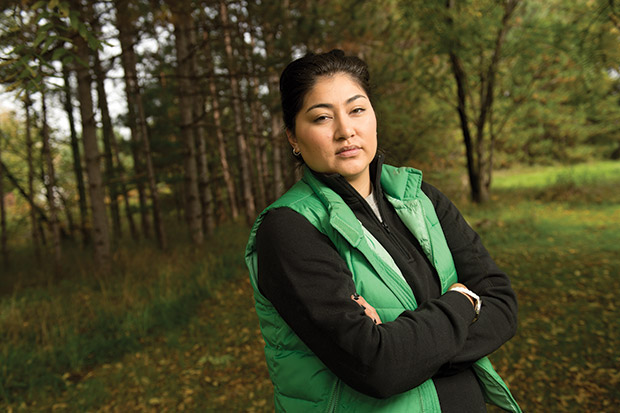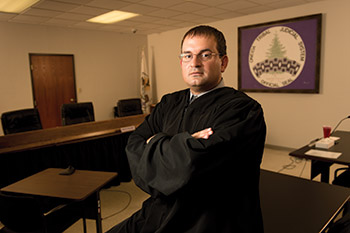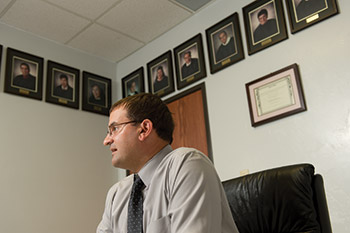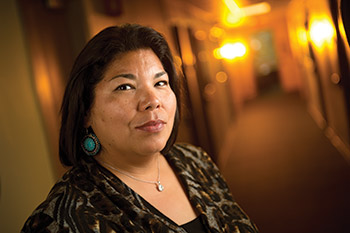Court review troubles tribes
By: Eric Heisig//November 3, 2014//
Justices due to consider case-transfer rule


A clash between a small group of Oneida Nation of Wisconsin members and tribal leadership has made its way to the state Supreme Court and could limit sovereignty for 10 other tribes.
The Oneida group, which seeks to stop what its members say is a dangerous tribal judiciary, is made up of people who claim they were spurned by judicial officers in the eastern Wisconsin tribe. Members have raised concerns about, among other things, conflicts of interest in the courts and judicial qualifications.
They submitted a petition in July asking the state’s highest court to take away circuit court judges’ rights to transfer civil cases to tribal courts because, the group argued, the tribal judges are incapable of properly handling the cases.
The petition targets Oneida Nation judicial officers. But such a change would have a scattershot effect throughout the state.
“They’re not just messing with their tribe,” said Ho-Chunk Nation Associate Judge Amanda WhiteEagle, who leads the Wisconsin Tribal Judges Association. “They’re messing with 11 separate sovereigns.”
Petitioner Nona Danforth, a member of Oneida Nation, said her request is not meant to affect the other tribes, but if it did, “then so be it.”
“These judges are supposed to be qualified,” Danforth said. “These people are not qualified at all.”
Oneida Nation judicial leaders say the petitioners are pushing a plan that would not solve the alleged problems and is not wanted by the majority of tribal members.
“It would mean that all of the people, my people, on the reservation would have to travel either to Green Bay or Outagamie County for their court case,” Oneida Nation Judicial Officer Winnifred Thomas said. “It’s a hardship that’s placed on them.”
The state Supreme Court rule, statute 801.54, which allows transfers from state to tribal courts, was passed with a 4-3 vote by the justices six years ago. That close vote, tribal leaders have said, has them worried that the petition could prompt reconsideration and reversal, which they say would be a step backward for tribal sovereignty.
Tribal courts across the state have grown since the court passed the rule. Oneida Family Court Judge Rob Collins estimated that about half of the cases he handles are transfers from state courts, mainly from Brown and Outagamie counties. And proponents of the rule say state judges favor the transfers because they shift many cases away from those courts.
Members of the Indian Law Section of the State Bar are following the petition’s progress. The tribal judges association and tribal leaders have attended the past two Supreme Court rules conferences to show their support for 801.54, though it was not discussed.
Statute supporters say they will keep showing up until the group’s petition or the rule is discussed. The court’s next rules conference is Nov. 17.
The push for sovereignty

The majority of cases transferred from state court involve child support. Since passage of the rule allowing transfers, most of the tribes have established child-support agencies and altered their laws to ensure the tribes have the procedures in place to handle the cases.
Oneida Nation in 2008 was the first to set up a child-support agency and has been a model for other tribes.
The idea behind the transfers is to let the tribes police matters involving their members. Proponents of sovereignty say a tribe is better equipped to handle decisions in a way that meets its cultural needs.
Some tribes, for example, offer services state judges may not know about, such as drug-treatment programs. And statute proponents say it is easier to collect child support, especially if the person paying works for the tribe, because the tribal courts can garnish wages or the per capita payments each member receives.
“Our laws are obviously different than the state laws,” WhiteEagle said. “We have our membership that has, maybe, some different cultural beliefs.”
‘Protect our children’
Six members of the Oneida Nation signed the petition to end case transfers. Two are young mothers, and one of those is Danforth, 26, mother to Yovanni Vega, 3.
Danforth said she became an outspoken critic of Oneida’s tribal court after a three-judge panel awarded joint custody of Yovanni to her and her ex-boyfriend, Vicente Vega. She claimed she presented evidence that her boyfriend was abusive and an unfit parent but that the court ignored it.
“I literally felt like my kid was taken away from me,” said Danforth, adding that she has custody of her son most of the time.
The case involving custody of Yovanni Vega was not a transfer from a state court. Danforth’s action was filed in the tribal court and stayed there.
Vicente Vega, 26, denied he was abusive and said Danforth “had absolutely no evidence” to show that. He also said Danforth opposes the tribe’s judiciary because she lost in court and wants to do anything she can to change that outcome.
But Danforth, who is registered with the Supreme Court’s clerk as the petitioning group’s leader, said there are other young mothers who support change but did not sign the petition because they are afraid of retaliation.
According to the petition, “We believe the government officials, relevant areas of the Oneida Tribe, the judicial system and its elected judicial officers, have failed to protect our children and families. For this reason, we have chosen to pursue this matter as a means to defend and protect our children and families to the best of our ability.”
Judicial concerns

The group last called for change in July 2013, according to its petition, but claimed Oneida Nation leaders ignored that and previous requests.
Complaints about the tribe’s court system, which has been in place since 1991, include judicial officers allegedly hearing cases involving family members and claims there were rulings that had no basis in law. Another petitioner, Linda Dallas, a former tribal judicial officer, said members of the judiciary often weigh what family a person comes from in making their decisions.
“I assure you,” Dallas said, “there’s people just like us in all the other tribes, too.”
Petitioners also raised concerns about qualifications because Oneida Nation judicial officers previously were not required to have a college degree. Those concerns and a need to update tribal laws prompted Oneida’s General Tribal Council in 2013 to approve overhauling the court system, said Councilwoman Melinda Danforth, who is a distant cousin to Nona Danforth’s father.
The Oneida Nation is in the midst of that overhaul. Tribal leaders rewrote the judge qualifications, which now require at least a four-year degree, and revised the judiciary’s ethics policy, both of which mean some judicial officers no longer will preside over cases. That includes Thomas, who does not have a college degree.
Instead of three-judge panels hearing cases at the trial level, as was customary under the old system, one judge will hear a case. If the case is appealed, a three-judge appeals court will hear it unless an appellant requests a hearing by all five appellate judges.
Last year, the tribe hired a judge, Collins, an Oconomowoc native who worked for Brown County Corporation Counsel and who handles family court cases. On Sept. 27, the tribe held elections for new judges, and the new system will be in place by March 1.
“I think the tribal leadership … really wanted to make sure that the family court had somebody who was a lawyer hearing the cases,” Collins said. “I think that the absence of that was the cause of some issues in the past.”
The changes have appeased some, such as Amanda Gerondale, an Oneida Nation member and 29-year-old mother of three. She said she worked with Nona Danforth early on because of the way Gerondale was treated by at least one former judge who she claimed favored men. Since Collins took over, though, Gerondale said she is happy with how her case has been treated, though her name remains on the petition.
“I’m actually very pleased with the court,” she said. “I’ve been three times since [Collins has] been in there.”
Because of complaints about the previous system, the tribe offered to have Collins preside over any cases heard under the old system. The judge said about eight people had their cases reheard.
Nona Danforth was not among them.
“It’s not that I don’t trust the guy that’s in there,” she said. “It’s the people around there.”
Leaders see success
Since 801.54 was enacted, thousands of cases have transferred to the tribal courts, WhiteEagle said. Neither she nor the Director of State Courts’ office could provide exact numbers.
Donald Zuidmulder, chief judge for the Eighth Judicial Circuit, which covers Brown, Door, Kewaunee, Marinette, Oconto, Outagamie and Waupaca counties, said it appears the petition would “cut off the ability of the state courts and tribal courts to be respectful of one another and have a dialogue on these issues.”
“That’s troubling to me,” he said.
Shorewood attorney John Swimmer, whose practice includes Indian law, said the transfer system is handled like any other motion practice, with responses and a judge’s order. That ensures the decision is made for the right reasons.
“If you don’t want your case going involuntarily, there are procedures in place,” Swimmer said. “Most of the cases that go are voluntary transfers.”
But the Supreme Court’s votes on allowing transfers always have been close, including in 2010 when it tweaked the law to let child-support cases transfer, and in 2011, when it reaffirmed the rule.
When the court voted in 2011, the justices said they would review 801.54 in 2016. Those who want to weigh in on the rule have until Jan. 1, 2016.
WhiteEagle said she has not heard many complaints about the tribal courts. She said she would be more concerned if the complaints were coming from a larger group, but added, “in the back of my mind, sure I’m concerned.”
Caroyl Long, the attorney for Oneida Nation’s child-support agency, has been at the past two rules conferences. She and WhiteEagle said they expect supporters of the transfer rule to be at the next two Supreme Court rules conferences to show solidarity.
“You’re going to either agree with tribal sovereignty or not,” Long said.
Nona Danforth and Dallas, who were not at either of those conferences, said they were surprised their petition has received so much attention.
But despite the changes in Oneida’s court, as well as the potential ramifications of abolishing the rule, Nona Danforth said it is only the beginning.
“We get through all the Supreme Court, I’m not done,” she said. “They have to be held accountable.” Follow @eheisigWLJ
Legal News
- Some State Bar diversity participants walk away from program
- Wisconsin court issues arrest warrant ‘in error’ for Minocqua Brewing owner
- Iranian nationals charged cyber campaign targeting U.S. Companies
- Facing mostly white juries, are Milwaukee County defendants of color truly judged by their peers?
- Milwaukee Mayor speaks in D.C. Tuesday at White House water summit
- Chicago man sentenced to prison after being caught with ‘Trump Gun’
- FTC bans non-competes
- Gov. Evers seeks applicants for Dane County Circuit Court
- Milwaukee man charged in dismemberment death pleads not guilty
- Democratic-led states lead ban on the book ban
- UW Madison Professor: America’s child care crisis is holding back moms without college degrees
- History made in Trump New York trial opening statements
WLJ People
- Power 30 Personal Injury Attorneys – Russell Nicolet
- Power 30 Personal Injury Attorneys – Benjamin Nicolet
- Power 30 Personal Injury Attorneys – Dustin T. Woehl
- Power 30 Personal Injury Attorneys – Katherine Metzger
- Power 30 Personal Injury Attorneys – Joseph Ryan
- Power 30 Personal Injury Attorneys – James M. Ryan
- Power 30 Personal Injury Attorneys – Dana Wachs
- Power 30 Personal Injury Attorneys – Mark L. Thomsen
- Power 30 Personal Injury Attorneys – Matthew Lein
- Power 30 Personal Injury Attorneys – Jeffrey A. Pitman
- Power 30 Personal Injury Attorneys – William Pemberton
- Power 30 Personal Injury Attorneys – Howard S. Sicula











